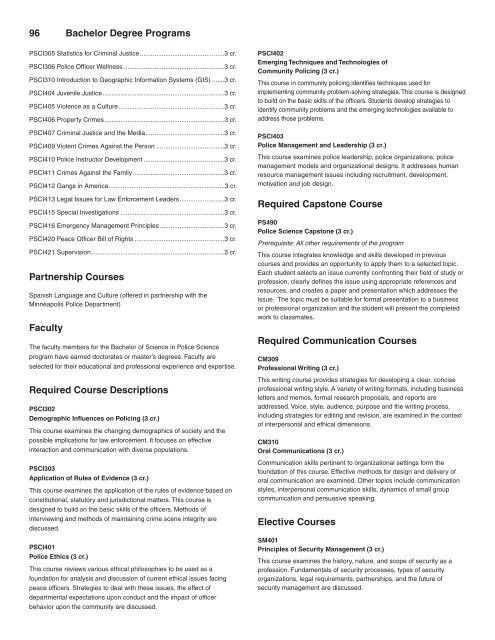& Student Handbook - Saint Mary's University of Minnesota
& Student Handbook - Saint Mary's University of Minnesota
& Student Handbook - Saint Mary's University of Minnesota
Create successful ePaper yourself
Turn your PDF publications into a flip-book with our unique Google optimized e-Paper software.
96 Bachelor Degree Programs<br />
PSCI305 Statistics for Criminal Justice ...............................................3 cr.<br />
PSCI306 Police Officer Wellness ........................................................3 cr.<br />
PSCI310 Introduction to Geographic Information Systems (GIS) .......3 cr.<br />
PSCI404 Juvenile Justice....................................................................3 cr.<br />
PSCI405 Violence as a Culture...........................................................3 cr.<br />
PSCI406 Property Crimes...................................................................3 cr.<br />
PSCI407 Criminal Justice and the Media............................................3 cr.<br />
PSCI409 Violent Crimes Against the Person ......................................3 cr.<br />
PSCI410 Police Instructor Development .............................................3 cr.<br />
PSCI411 Crimes Against the Family ...................................................3 cr.<br />
PSCI412 Gangs in America.................................................................3 cr.<br />
PSCI413 Legal Issues for Law Enforcement Leaders.........................3 cr.<br />
PSCI415 Special Investigations ..........................................................3 cr.<br />
PSCI416 Emergency Management Principles ....................................3 cr.<br />
PSCI420 Peace Officer Bill <strong>of</strong> Rights ..................................................3 cr.<br />
PSCI421 Supervision ..........................................................................3 cr.<br />
Partnership Courses<br />
Spanish Language and Culture (<strong>of</strong>fered in partnership with the<br />
Minneapolis Police Department)<br />
Faculty<br />
The faculty members for the Bachelor <strong>of</strong> Science in Police Science<br />
program have earned doctorates or master’s degrees. Faculty are<br />
selected for their educational and pr<strong>of</strong>essional experience and expertise.<br />
Required Course Descriptions<br />
PSCI302<br />
Demographic Influences on Policing (3 cr.)<br />
This course examines the changing demographics <strong>of</strong> society and the<br />
possible implications for law enforcement. It focuses on effective<br />
interaction and communication with diverse populations.<br />
PSCI303<br />
Application <strong>of</strong> Rules <strong>of</strong> Evidence (3 cr.)<br />
This course examines the application <strong>of</strong> the rules <strong>of</strong> evidence based on<br />
constitutional, statutory and jurisdictional matters. This course is<br />
designed to build on the basic skills <strong>of</strong> the <strong>of</strong>ficers. Methods <strong>of</strong><br />
interviewing and methods <strong>of</strong> maintaining crime scene integrity are<br />
discussed.<br />
PSCI401<br />
Police Ethics (3 cr.)<br />
This course reviews various ethical philosophies to be used as a<br />
foundation for analysis and discussion <strong>of</strong> current ethical issues facing<br />
peace <strong>of</strong>ficers. Strategies to deal with these issues, the effect <strong>of</strong><br />
departmental expectations upon conduct and the impact <strong>of</strong> <strong>of</strong>ficer<br />
behavior upon the community are discussed.<br />
PSCI402<br />
Emerging Techniques and Technologies <strong>of</strong><br />
Community Policing (3 cr.)<br />
This course in community policing identifies techniques used for<br />
implementing community problem-solving strategies. This course is designed<br />
to build on the basic skills <strong>of</strong> the <strong>of</strong>ficers. <strong>Student</strong>s develop strategies to<br />
identify community problems and the emerging technologies available to<br />
address those problems.<br />
PSCI403<br />
Police Management and Leadership (3 cr.)<br />
This course examines police leadership, police organizations, police<br />
management models and organizational designs. It addresses human<br />
resource management issues including recruitment, development,<br />
motivation and job design.<br />
Required Capstone Course<br />
PS490<br />
Police Science Capstone (3 cr.)<br />
Prerequisite: All other requirements <strong>of</strong> the program<br />
This course integrates knowledge and skills developed in previous<br />
courses and provides an opportunity to apply them to a selected topic.<br />
Each student selects an issue currently confronting their field <strong>of</strong> study or<br />
pr<strong>of</strong>ession, clearly defines the issue using appropriate references and<br />
resources, and creates a paper and presentation which addresses the<br />
issue. The topic must be suitable for formal presentation to a business<br />
or pr<strong>of</strong>essional organization and the student will present the completed<br />
work to classmates.<br />
Required Communication Courses<br />
CM309<br />
Pr<strong>of</strong>essional Writing (3 cr.)<br />
This writing course provides strategies for developing a clear, concise<br />
pr<strong>of</strong>essional writing style. A variety <strong>of</strong> writing formats, including business<br />
letters and memos, formal research proposals, and reports are<br />
addressed. Voice, style, audience, purpose and the writing process,<br />
including strategies for editing and revision, are examined in the context<br />
<strong>of</strong> interpersonal and ethical dimensions.<br />
CM310<br />
Oral Communications (3 cr.)<br />
Communication skills pertinent to organizational settings form the<br />
foundation <strong>of</strong> this course. Effective methods for design and delivery <strong>of</strong><br />
oral communication are examined. Other topics include communication<br />
styles, interpersonal communication skills, dynamics <strong>of</strong> small group<br />
communication and persuasive speaking.<br />
Elective Courses<br />
SM401<br />
Principles <strong>of</strong> Security Management (3 cr.)<br />
This course examines the history, nature, and scope <strong>of</strong> security as a<br />
pr<strong>of</strong>ession. Fundamentals <strong>of</strong> security processes, types <strong>of</strong> security<br />
organizations, legal requirements, partnerships, and the future <strong>of</strong><br />
security management are discussed.
















